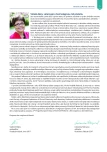The review of drug interactions and risks of statin therapy
Authors:
Jana Sirotiaková
Authors‘ workplace:
Interné oddelenie NsP, Levice
Published in:
AtheroRev 2017; 2(1): 10-14
Category:
Reviews
Overview
During the recent years statins (HMG CoA reductase inhibitors) have gained one of the most important possessions in the field of pharmacotherapy. They exert primarily very good hypolipidemic properties with high impact on lowering both total and LDL-cholesterol, powerful predictors of cardiovascular morbidity and mortality. Statins are also well known for their pleiotropic effects and are overall considered to be well tolerated drugs, which have been verified by many controlled randomized clinical trials and meta-analysis. The frequency of clinically important serious adverse events is relatively low, but in patients at a high risk a serious drug induced damage may appear in case of drug treatment. The real risk of statins is related not only directly to the risk potential of the statin molecule but also to concomitant administration to risk groups of patients.
Key words:
HMG CoA reductase inhibitors, drug interactions, statins, risk of the treatment
Sources
1. Rašlová K, Tkáč I, Fábryová Ľ. Racionálna liečba dyslipoproteinémií. Metodický list Ústrednej komisie racionálnej farmakoterapie a liekovej politiky MZ SR 2005; 9(36): 1–6.
2. Werner N, Nickenig G, Laufs U. Pleiotropic effects of HMG-CoA reductase inhibitors. Basic Res Cardiol 2002; 97(2): 105–116.
3. Pella D, Mechírová V, Rybár R et al. Pleiotropné účinky statínov. Interná med 2004; 4(4): 259–261.
4. Böger RH. Drug interaction of the statins and consequences for drug selection. Int J Clin Pharmacol Ther 2001; 39(9): 369–382.
5. Gajdoš M. Rosuvastatín: nový inhibítor 3-hydroxy-3-methylglutaryl koenzým A reduktázy. Interná med 2003; 3(12): 753–754.
6. Murty M, Mc Morran M, Vu D. Statins : rhabdomyolysis and myopathy. CMAJ 2002; 166(1): 85–86; 90–91.
7. Framer JA. Learning from the cerivastatin experience. Lancet 2001; 358(9291): 1383–1385.
8. Pedersen TR, Tobert JA. Benefits and risks of HMG-CoA reductase inhibitors in the prevention of coronary heart disease: a reappraisal. Drug Saf 1996; 14(1): 11–24.
9. Pasternak RC, Smith SC, Bairey-Merz NC et al. ACC/AHA/NHLBI Clinical Advisory on the Use and Safety of Statins, J Am Coll Cardiol 2002; 40(3): 567–572.
10. [Cholesterol Treatment Triallists´ (CTT) Collaboration]. Efficacy and safety of more intensive lowering of LDL cholesterol: a meta – analysis of data from 170,000 participants in 26 randomised trials. Lancet 2010; 376(9753): 1670–1681. Dostupné z DOI: <http://dx.doi.org/10.1016/S0140–6736(10)61350–5>.
11. SEARCH Collaborative Group. SLCO1B1 Variants and statin-Induced Myopathy – A Genomewide Study. N Engl. J Med 2008; 359(8): 789–799. Dostupné z DOI: <http://dx.doi.org/10.1056/NEJMoa0801936>.
12. FDA Drug Safety Communication: Important safety label changes to cholesterol-lowering statin drugs. [28.2.2012]. Dostupné z WWW: <http://www.fda.gov/Drugs/DrugSafety/ucm293101.htm>.
13. Hey-Hadavi JH, Kuntze E, Luo D et al.Tolerability of atorvastin in a population aged ˃ or 65years: a retrospective pooled analysis of results from fifty randomized clinical trials. Am J Geriatr Pharmacother 2006; 4(2): 112–122.
14. Vrablík M. Co se děje v současnosti kolem statinů? Remedia 2013; 23(2): 151–154.
15. Catapano AL, Reiner Z, De Backer G et al. ESC/EAS Guidelines for the management of dyslipidemias. Atherosclerosis 2011; 217(1): 3–46.
16. Sattar N, Preiss D, Murray HM et al. Statins and risk of incident diabetes: a collaborative meta-analysis of randomised statin trials. Lancet 2010; 375(9716): 735–742. Dostupné z DOI: <http://dx.doi.org/10.1016/S0140–6736(09)61965–6>.
17. Sampson UK, Linton MF, Fazio S. Are statins diabetogenic? Curr Opin Cardiol 2011; 26(4):342–347. Dostupné z DOI: <http://dx.doi.org/10.1097/HCO.0b013e3283470359>.
18. Ridker PM, Pradhan A, MacFadyen JG et al. Cardiovascular benefits and diabetes risks of statin therapy in primary prevention: an analysis from the JUPITER trial. Lancet 2012; 380(9841): 565–571. Dostupné z DOI: <http://dx.doi.org/10.1016/S0140–6736(12)61190–8>.
19. Waters DD, Ho JE, Boekholdt S et al. Cardiovascular event reduction versus new-onset diabetes during atorvastatin therapy: effect of baseline riskfactors for diabetes. J Am Coll Cardiol 2013; 61(2): 148–152. Dostupné z DOI: http://dx.doi.org/10.1016/j.jacc.2012.09.042>.
20. Shepherd J, Blauw GJ, Murphy MB et al. Pravastatin in elderly individualsat risk of vascular disease (PROSPER): randomised controlled trial. Lancet 2002; 360(9346): 1623–1630.
21. Emberson JR, Kearney PM, Blackwell L et al. [Cholesterol Treastment Triallists´(CTT) Collaboration]. Lack of effect of lowering LDL cholesterol on cancer: meta-analysis of individualdata from 175,000people in 27randomised trialson statin therapy. PLoS One 2012; 7(1): e29849. Dostupné z DOI: <http://dx.doi.org/10.1371/journal.pone.0029849>.
22. Nicholls SJ, Borgman M, Nissen SE et al. Impact of statins on progression of atherosclerosis: rationale and design of SATURN (Study of Coronary Atheroma by Intravascular Ultrasound : effect of Rosuvastatin versus Atorvastatin. Curr Med Res Opin 2011; 27(6): 1119–1129. Dostupné z DOI: <http://dx.doi.org/10.1185/03007995.2011.570746>.
23. Chan DK, O´Rourke F, Shen Q et al. Meta-analysis of the cardiovascular benefits of intensive lipid lowering therapy with statins. Acta Neurol Scand 2011; 124(3): 188–195. Dostupné z DOI: <http://dx.doi.org/10.1111/j.1600–0404.2010.01450.x>.
24. Karalis DG, Hill AN, Clifton S et al. The risks of statin use in pregnancy: A systematic review. J Clin Lipidol 2016; 10(5): 1081–1090. Dostupné z DOI: <http://dx.doi.org/10.1016/j.jacl.2016.07.002>.
Labels
Angiology Diabetology Internal medicine Cardiology General practitioner for adultsArticle was published in
Athero Review

2017 Issue 1
Most read in this issue
- Adherence to treatment – an important part of reaching therapeutic effects on chronic conditions
- The review of drug interactions and risks of statin therapy
- Adherence to treatment according to the psychologist
- A diabetologist‘s view on the metabolic surgery in the treatment of patients with type 2 diabetes
